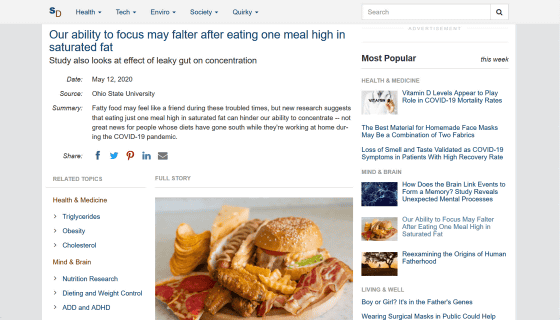Research results that diets high in saturated fatty acids reduce concentration and attention

Due to the epidemic of the new coronavirus infection (COVID-19), people cannot go out and play, so at least many people try to eat delicious food at home and try to relieve their stress. Although some people may be overwhelmed by fat-rich food, a research team at Ohio State University says that a diet with a high amount of
Afternoon distraction: a high-saturated-fat meal and endotoxemia impact postmeal attention in a randomized crossover trial
https://academic.oup.com/ajcn/advance-article-abstract/doi/10.1093/ajcn/nqaa085/5835679
Our ability to focus may falter after eating one meal high in saturated fat: Study also looks at effect of leaky gut on concentration --ScienceDaily
https://www.sciencedaily.com/releases/2020/05/200512134433.htm

Annelise Madison, the lead author of this paper and a researcher in clinical psychology at Ohio State University, conducted an experiment with 51 women in their 40s and 60s. The test subjects visited the laboratory on the morning of the experiment, completed a test using a computer to check their attention, concentration, and reaction for 10 minutes, and ate a meal prepared by the research team.
There were two types of meals provided by the research team, each containing eggs, biscuits, turkey sausage,
Five hours after eating, subjects again took the test to check their alertness, concentration and reaction. Subjects also returned to the lab one to four weeks after conducting a series of experiments. On the second visit, the subjects had the opposite type of meal they had when they first performed the experiment, and they had the same test with the meal in between.
The research team also collected blood when the subjects were hungry and checked for biomarkers of inflammation due to the invasion of endotoxin into the blood. It seems that endotoxin easily enters the blood from the intestine when it becomes a leaky gut in which a hole is present in the mucous membrane of the intestine and bacteria, viruses, and proteins leak into the blood vessels.

As a result of the experiment, subjects after eating a diet rich in saturated fatty acids dropped their test scores by an average of 11%. Researchers also noted that women with signs of leaky gut had extremely low test scores regardless of the type of food they ate. 'In women with high levels of endotoxin in their blood, the difference in diet was eliminated. Whatever fat the subjects ate, performance was poor,' Madison said. ..
The research team standardized the meal content that the subjects eat the day before the experiment, and they fasted for 12 hours before the experiment, so the meal eaten in advance did not affect the test results ..
The study didn't determine the effects of saturated fatty acids or leaky gut on the brain, but past studies have found that a diet rich in saturated fatty acids promotes systemic inflammation. Fatty acids can

Madison said, 'Most of the previous studies examining the effects of diet have been investigated over a period of time. It's amazing how only one meal made a difference, like this one.' Commented. This study compared a diet rich in saturated fatty acids with a diet containing unsaturated fatty acids, showing a greater effect when comparing a diet rich in saturated fatty acids with a diet low in fat. There is a possibility that it will be.
'We know that when people feel anxious, a diet high in saturated fatty acids looks attractive,' said

Related Posts:







